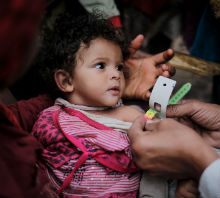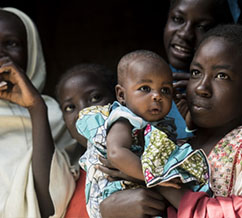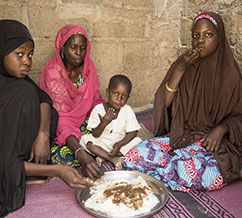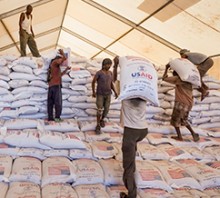Speeches Shim
During the September 18–22 UN General Assembly in New York, USAID Administrator Green announced nearly $54 million in additional FY 2017 funding for the humanitarian response in Nigeria, including nearly $28.9 million in USAID/OFDA funding, more than $22.7 million in USAID/FFP funding, and $2.4 million in State/PRM funding.
Health actors, including U.S Government (USG) partners, continue to scale up health and water, sanitation, and hygiene (WASH) activities in response to the cholera outbreak in northeastern Nigeria’s Borno State. Between mid-August and September 13, health authorities recorded more than 1,900 suspected and confirmed cases, including 44 associated deaths, in Borno’s capital city of Maiduguri and Dikwa and Monguno local government areas (LGAs), according to the Borno State Ministry of Health (SMoH).
As of September 7, health agencies had recorded more than 629,000 suspected cholera cases and 2,061 related deaths since the outbreak resurged in late April, according to USAID/OFDA partner the UN World Health Organization (WHO). While the number of weekly cholera cases in Yemen declined between early July and mid-August, WHO reported a slight increase in the total number of weekly cases during the weeks of August 14 and August 21—the first increase in approximately six weeks
In July, relief organizations recorded the highest number of monthly humanitarian access incidents in South Sudan since 2016, underscoring the arduous operating environment. USAID/FFP partner the UN World Food Program (WFP) has reached 4.2 million unique beneficiaries in South Sudan to date in 2017, exceeding the UN agency’s total beneficiaries in 2016. In July alone, WFP reached 2.9 million beneficiaries, the highest number of registered people assisted in the country in a one-month period since 2011.
Health officials confirm cases of cholera in northeastern Nigeria’s Borno State. Insecurity and inclement weather exacerbate existing food and nutrition needs in the Lake Chad Basin. Flooding in Niger affects nearly 60,000 people, primarily near the Nigerian border





Comment
Make a general inquiry or suggest an improvement.